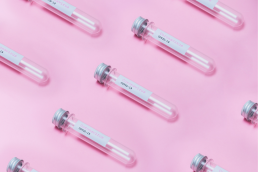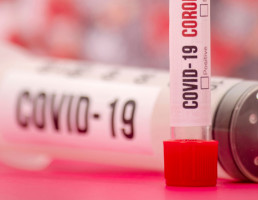15 Minute COVID Testing Now Available
We are currently offering both Antigen and PCR testing!
What is the difference between Antigen and Antibody Testing? And when should I test?
An antigen test may be recommended for patients that have active symptoms of COVID or may have been recently exposed to COVID. While an antibody test may be recommended for a person who was previously exposed or had COVID wants to know if the body has developed an antibody for COVID-19.
An antigen test is designed to detect antigen early on and as the duration of illness increases an antigen sample may decrease. Specimens collected after day 5 of illness may be more likely to be negative compared to a RT-PCR assay.
An antibody test is suggested to detect as early as 2 weeks after symptoms start, peaks at 3 to 4 weeks and wanes over time.
What are the possible benefits of Antigen Test?
The possible benefits of a COVID-19 antigen test are that the results are quick and may help your doctor make informed recommendations about your care. In addition the results may help to limit the spread of COVID-19 to your family, friends and community.
What is the name of the Antigen Test that is being offered?
The antigen test that we are offering is the CareStart Rapid Antigen Test. This test is a lateral flow immunochromatographic assay that provides a qualitative detection of COVID-19 protein antigens.
What are the possible benefits of Antibody Test?
The possible benefits of a COVID-19 Antibody test are results are quick and may help a patient reveal if the body has made antibodies to COVID-19. The test gives a qualitative or “yes/no” result in about 15 minutes. Antibodies may provide additional protection against COVID-19. In addition you may qualify to donate Convalescent donor plasma which may help patients with active COVID-19 infections.
What is the name of the Antibody Test that is being offered?
The antibody test being offered is called the FaStep Rapid test. This test is a lateral flow immunochromatographic assay that provides a qualitative detection of COVID-19 Antibodies (IgM and IgG). The test is labeled as 100% sensitive and 98.8% specificity and published data suggests that this test has 100% sensitivity and 80% specificity.
Are the Antigen or Antibody Test FDA approved?
These tests have an Emergency Authorization Use (EUA) from the FDA. FDA may issue EUA when certain criteria are met, which includes that there are no adequate, approved, available alternatives, and based on the totality of scientific evidence available. An EUA has not undergone the same type of review as an FDA-approved Test and is not FDA-approved or cleared.
What to expect when arriving for COVID testing?
We ask that you call ahead to schedule an appointment (same day appointments are available).
If you are taking the antigen test, when you arrive, please park in the curbside pick up spot and call us at 619-303-7771. The pharmacist will come to your car and administer the test.
The antibody will be administered in the pharmacy with safety pre-cautions.
For the antigen test the pharmacist will insert a cotton swab into one nostril. The swab is then slowly rotated in a circle three to 5 times.
For the antibody test the pharmacist will draw a small amount of blood by performing a finger stick prick.
Results will be read in about 10 to 15 minutes.
What happens if I test positive for COVID-19 testing?
If you test positive for antibody test, you should continue to follow CDC guidelines including physical distancing, handwashing and mask-wearing. A positive test does NOT mean the patient’s immune or protected from reinfection.
What does it mean if I test negative for COVID-19 Antigen or Antibody testing?
A negative test does not mean the patient does not have COVID-19 or antibody. It is best to discuss with your provider.
If an antigen test was performed you may want to follow up with a PCR test (results are usually given within 1-2 days to up to 1 week) to confirm, if COVID-19 is still suspected based on exposure history together with other clinical findings.
If you received a negative test with an antibody test you may have tested too early or time may lapsed where your body may no longer have antibodies.
What may cause a false negative result?
False negative results may occur in patients currently taking or have a history of taking high doses of biotin (more than 10 mg per day).
COVID Testing
We have all heard that the key to preventing the virus from spreading is testing. But what types of tests are available and which one is the best?
As far as COVID testing there is not one test that is the BEST. It all depends on the person’s situation. The best way to determine which test is best for you is to work with your provider or pharmacist. Here is some information about the three different categories of tests that are available: PCR (a nasal or throat swab), Antigen (a nasal or throat swab) and an Antibody (a blood test).
PCR and Antigen are considered diagnostic tests as they can detect the virus earlier, while an antibody test detects antibodies later on. None are available to purchased directly by the consumer at this time.
PCR test is best to be used before or during symptoms. The virus is easily detectable within 7 to 10 days of illness. The test uses a process to test molecular breakdown of the virus. The Abbott ID Now test which delivers results within as little as 5 minutes is a PCR test.
An Antigen test is not reliable until symptoms exist. The peak or optimum testing time is about 3 to 5 days. The test is testing the coating of the virus.
The Antibody testing does not focus on checking the virus itself, but whether your immune system has built antibodies in response to the infection. It involves a small finger prick blood sample that takes at least 10 days to detect IgM antibody. Around 2 to 3 weeks later it can also detect IgG. These tests should be performed only on people that never had symptoms or it has been at least 7 days since their last symptom. If tested earlier, clinical reliability may be compromised.
More about Antibody testing…
There have been reports about fraudulent tests that are being sold. Here are a few things to watch for. As of now, there are no antibody tests on the market that have FDA approval, this will change with time. Testing kits are registering with the FDA and some have been granted an EUA (emergency authorization) by the FDA, but they are still not FDA approved. If you choose to receive an antibody test you will want to ask the person offering testing if they have checked and validated that the test has been registered with the FDA. In addition, tests that are on the market should have used PCR and not ELISA to validate their negative and positive results, as PCR is considered “Gold Standard” for COVID.
As far as the antibody test it tests for the antibodies IgM and IgG. IgM is the first antibody response to be detected. If IgG is detected and the level has become higher than IgM this means the maximum immunity response has occurred.
Keep in mind that these are qualitative tests not quantitative tests. This means it does not tell you how many antibodies, so it does not tell you if you are immune or how long you are immune. To measure immunity, you need to measure a titer, similar to a titer test performed after receiving your hepatitis B vaccines.
Therefore, Antibody testing does not tell you if you are immune but it does help in making decisions as far as when a person can stop being in quarantine and return to the workforce. It also helps with identifying donors for COVID-19 convalescent plasma.
In addition, look for the following to be labeled on a test:
1. This test has not been reviewed by the FDA
2. Negative results do not rule out SARS-CoV2 infection, particularly in those who have been in contact with the virus. Follow up testing with a molecular diagnostic should be considered to rule out infection in these individuals
3. Results from antibody testing should not be used as the sole basis to diagnose or exclude SARS-CoV2 infection or to inform infection status
4. Positive results may be due to past or present infection with non-SARS-CoV2 strains, such as coronavirus HKU1, NL63, OC43, 229E

